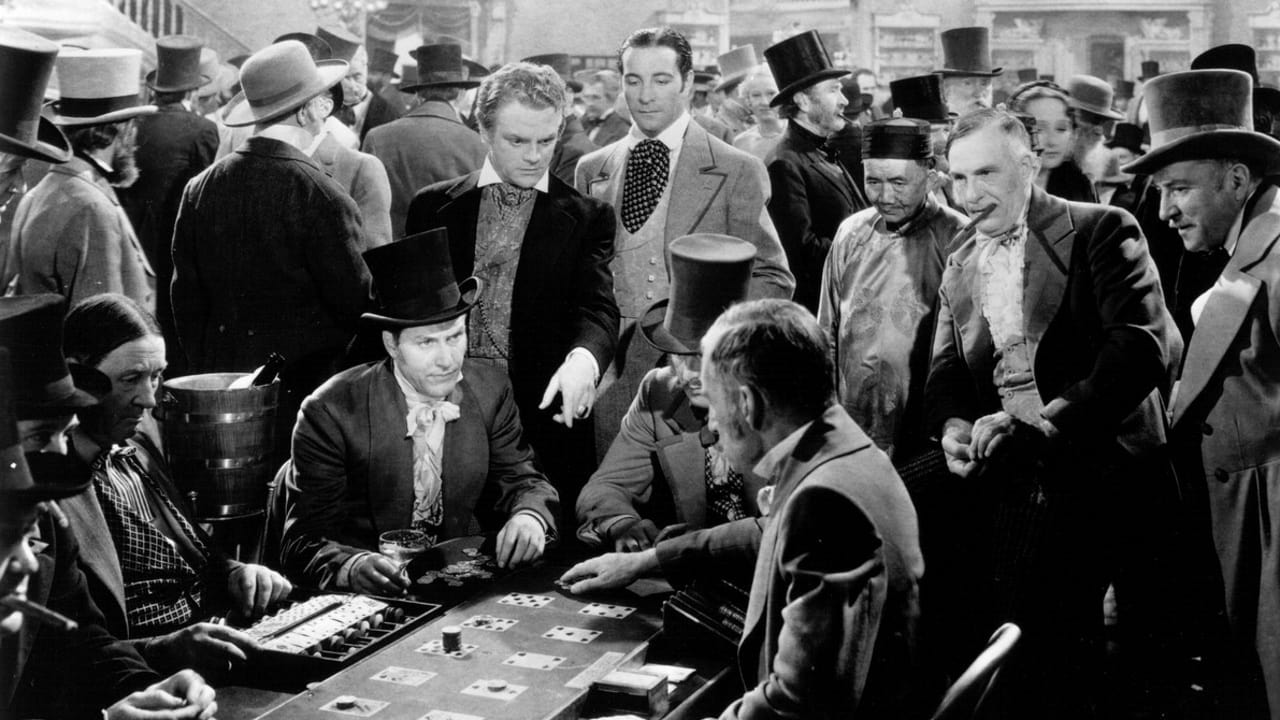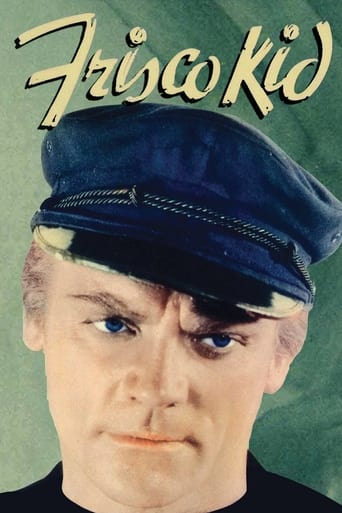Stometer
Save your money for something good and enjoyable
FeistyUpper
If you don't like this, we can't be friends.
FirstWitch
A movie that not only functions as a solid scarefest but a razor-sharp satire.
Haven Kaycee
It is encouraging that the film ends so strongly.Otherwise, it wouldn't have been a particularly memorable film
jjnxn-1
It seems odd this drama from Cagney's main star period would be obscure until you watch it.Cagney is dynamic as ever but those two cinematic black holes Margaret Lindsay and Donald Woods stop the film dead in its tracks whenever they appear in a scene.Lindsay, who Warners tried their damnedest to make into a star, is stiff and affected in the female lead. Her scenes with Cagney become more an interesting example of star quality and naturalism versus posturing for the camera than believable love scenes. In their close-ups he is animated and alive and she seems to be waiting for him to finish talking so she can flatly deliver her lines. Woods is even worse but his role is smaller so he is less irksome but when he's not on screen you don't miss him. As far as the film's storyline it's standard stuff about the clash between the Barbary Coast and Nob Hill society. If you're a Cagney fan it's worth checking out but one viewing will probably be enough.
calvinnme
This film starts out rather implausibly. Sailor Bat Morgan (James Cagney) wanders into a Barbary Coast saloon and almost gets shanghaied by a trio dedicated to that business. He does manage to escape and is helped by a kindly Jewish tailor (George E. Stone as Sully Green). What's rather implausible is that Sully basically has to teach a sailor that has docked in the port of San Francisco what shanghaiing is and that the Barbary Coast is dangerous. Really? A seasoned sailor docking in San Francisco has never heard of the Barbary Coast or shanghaiing or why it is profitable for criminals? You'd think Bat Morgan was a common tourist from the Midwest with a defective GPS. What happens next was a little off-putting for a Cagney fan like myself. Naturally, Cagney's character decides to go back to the bar and teach those three thugs a lesson. How he did it left a bad taste in my mouth. Bat shanghais the shanghai-er as he is getting ready to take yet another unconscious victim to a ship. But he also shanghais the poor unconscious slob that was just a victim like he had been a couple of hours ago! Now I'm prepared to see Cagney's character rough up and victimize fellow bad guys in a film, but he usually shied away from making victims of innocent bystanders.At this point the film makes a distinctive turn from where it's been going the first 15 or 20 minutes and becomes less surprising and more of a conventional action picture. Bat Morgan - who never goes back to his ship - begins to make his fortune on the Barbary Coast by more conventional methods. At first he works for Barbary Coast saloon proprietor Paul Morra (Ricardo Cortez), then he works his way up by enlarging the take of corrupt San Francisco officials, and uses his part of the pot to build an upscale establishment on the Barbary Coast himself.Meanwhile, the beautiful owner of a newspaper dedicated to wiping out corruption (Margaret Lindsay as Jean) enlists an editor to help her in her goal of cleaning up The Coast and outing the corrupt officials that protect it. Donald Woods plays the honest editor she hired who never has a chance with Jean once Cagney's Bat Morgan gets a look at her and starts batting his baby blues. So here you have a corrupt guy and a beautiful classy girl dedicated to wiping out corruption falling in love. Rather predictable complications ensue.High points of this production are, most obviously James Cagney, George E. Stone in an endearing role as Cagney's mild mannered and loyal friend the tailor, and Fred Kohler in a minor role as the aptly named Shanghai Duck who looks like he hasn't bathed in a month of Sundays. Ricardo Cortez gives an overly restrained performance as Barbary Coast big shot Paul Morra, and Lili Damata is wasted here as his wife. Unexpected is the viewpoint that a mob on horseback is lawlessness, but a mob sitting down in a large room is an acceptable form of government, and that common criminals going to the opera is an unspeakable breach of etiquette. Watch the film to see what I'm talking about. This one is a take-it-or-leave-it proposition, largely made so because studios had to turn to period pieces like this one immediately after the production code took effect in order to blunt the interference from the censors without really knowing what to do with the material.
jc-osms
Terrible title for a watchable Cagney vehicle, which seems like so many of his early films, to move at breakneck speed. Like so many of his major roles, there's a duality at play, with his Bat Morgan character initially winning viewer sympathy by fighting back against bullying gangsters in San Francisco's notorious "Barbary Coast" quarter and loyally looking out for his Jewish sidekick, only to be seduced by the lure of power and money to rise to the top of the greasy pole by being bigger and badder than the competition and getting on-side with the corrupt big-time politician Big Jim Daley.There's love interest too in the prim and proper person of Margaret Lindsay the managing editor of the crusading local paper, whose handsome daily editor Donald Woods serves as uneasy ally, love rival and straight-and-narrow example to Cagney, before invoking one of a series of murdered decent citizens which causes the law-abiding majority to turn to vigilantism in a literally riotous finish with Cagney naturally rejecting the dark-side and even getting the girl.How true the story here is to the growing pains of the real San Francisco, will have to wait until my next visit to the reference library, but the story suffers from Cagney's character whose rise and fall and rise again is too unlikely to seem credible. You feel a better, more straight-forward film would have concentrated on the zealous editor's story rather than Cagney's flawed hero. There also seem to be just too many characters, incidents and plot developments telescoped into the film's short playing time which the editing can't bring together coherently.For once I couldn't believe enough in Cagney's character and felt he gives an untypically mixed performance, although the problem here could be in the writing. Better are Lindsay as the posh proprietor who unconvincingly crosses the tracks for Cagney and Woods as the socially conscious but doomed editor Ford. The mob-scene finale calls for the marshaling of large crowds of actors which is accomplished believably and effectively, but in the end, the all-loose-ends-tied up optimistic ending let's down the preceding drama.For me this was a welcome chance to see the young Cagney in a rarely-screened film. To be fair it's just too fast-paced to really hang together though, better roles, better written and to be honest, better acted, lay ahead for him.
MartinHafer
In some ways, this film is VERY typical of Cagney's films for Warner Brothers in the 1930s--featuring Cagney as a pugnacious and power-driven guy who manages to make it to the top--we've certainly seen all this before! And, along with this character, the production values are very high and the film is quite entertaining. However, at the same time, the film is a bit unusual because the character Cagney plays isn't purely larcenous and mid-way through the film he starts to change his stripes and goes from bad guy to good guy! And, the ending is one of the strangest of the era! Cagney arrives in the Barbary Coast portion of San Francisco in the 1850s--after the Gold Rush has begun and it's in full swing. Cagney is almost shanghaied when the film starts but because he is the hero, he wakes up in time and escapes. Seeing the evil of the town, he decides "if you can't beat 'em, join 'em,...or maybe organize them into a union of sorts". And, very quickly he goes from newbie to boss of the underbelly of society. But, the good people of San Francisco are tired of the sleaze and corrupt government so they resort to the great bastion of freedom and decency--mob rule complete with executions! At least that's the message I seemed to get from the film. Since Cagney sees the light just in time, he tries his best to stop the corruption before the crowds exact vengeance, but for most it's too late. When the mob does assume control, everyone not executed seems pretty happy and the film ends! ODD, ODD, ODD!!!

